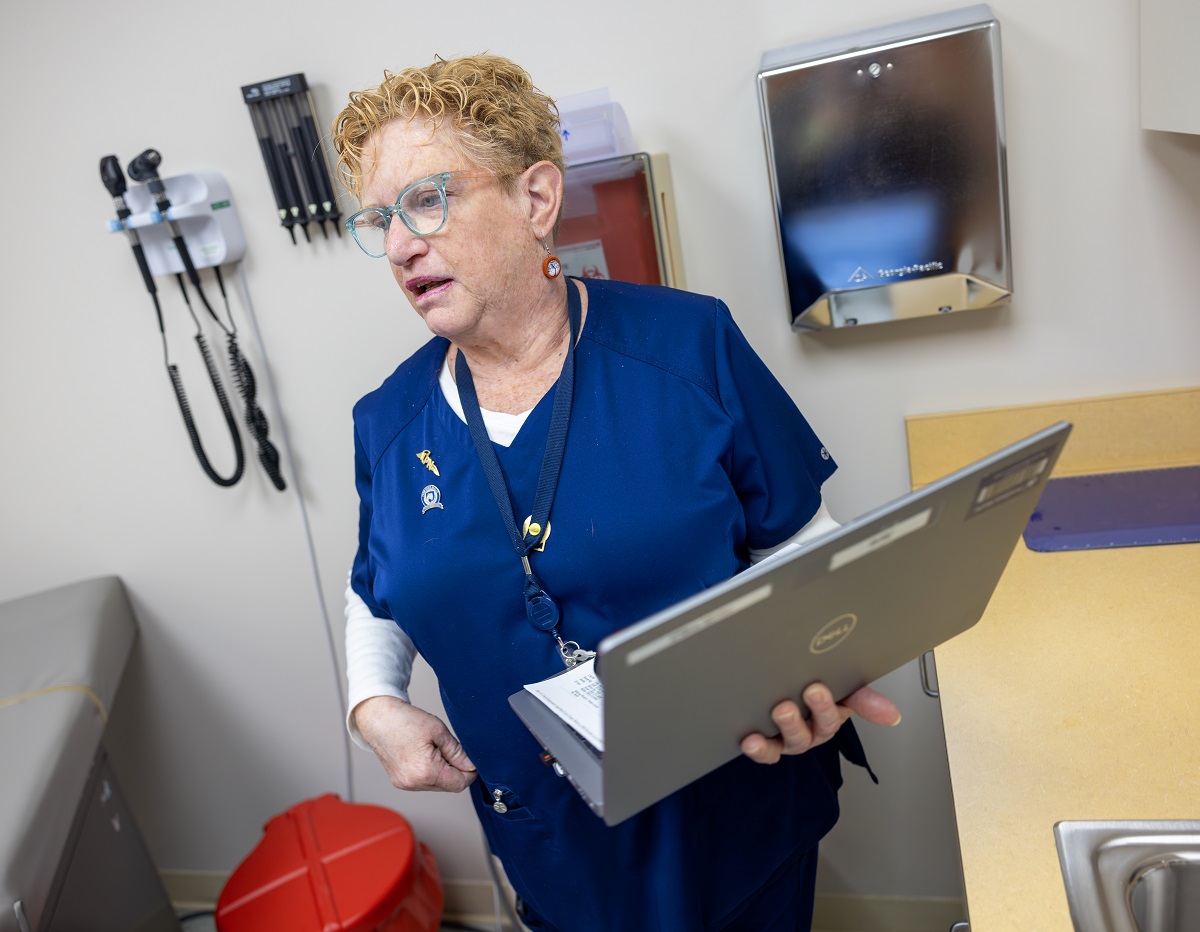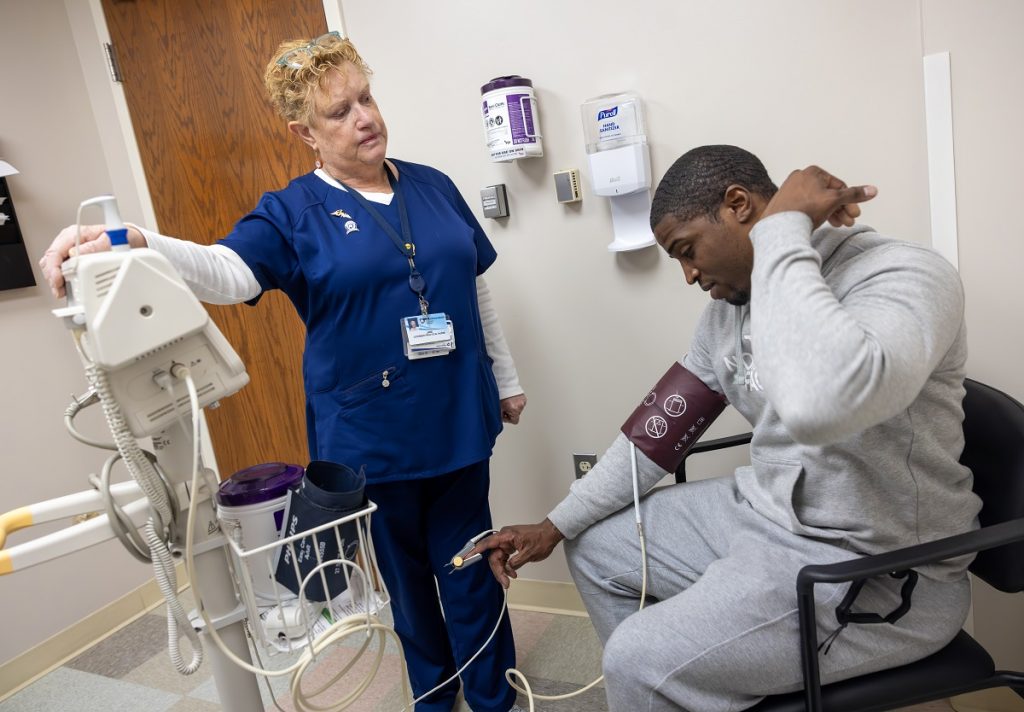Penn State Health St. Joseph Medical Center nurses reflect on their ‘noble profession’

From her earliest memories as a young girl, Jane Pizarro wanted to be a nurse and act on a natural desire to nurture and take care of those around her.
“I always liked taking care of the kids in my neighborhood and hanging around adults,” she said. “It’s why I went into nursing, to take care of people.”
Pizarro has worked for 24 years as a licensed practical nurse at Penn State Health St. Joseph Medical Center’s Downtown Campus in Reading.
During National Nurses Week, May 6-12, Pizarro shared her career story with two other St. Joseph Medical Center nurses who related why they entered the profession and how the medical center supports nursing.
Founded in 1873 by the Sisters of St. Francis of Philadelphia as St. Joseph Hospital, the institution has always been committed to supporting the nursing profession. It hosted a school of nursing from 1903 to 1990 and continues to offer training for nursing students from Alvernia College and other local colleges. St. Joseph Medical Center joined Penn State Health in 2015 and now employs about 600 nurses.
“We are so proud of our nurses and the entire nursing team at St. Joseph,” said Wendy Clayton, vice president and chief nursing officer.
Pizarro, who received her nursing degree at the Jersey City Medical Center, said one her most vivid memories was accompanying one of the first patients into the newly opened St. Joseph Medical Center in 2006 after the original hospital in Reading closed. To her, that moment symbolized St. Joseph’s commitment to serving patients in Berks County.
Assigned to the residency practice at Penn State Health St. Joseph Downtown Campus, her daily schedule involves reviewing patients’ charts, taking their vital signs and briefing the attending doctor before visiting with the patients. She proposes medication orders and oversees orders for tests.
Limitless opportunities
Like Pizarro, Jamie Williams, co-chief nurse anesthetist at St. Joseph Medical Center, always loved caring for people and knew she was destined to work in health care.
“In nursing school, a professor had assigned a project where each student had to research a different type of nursing role. There were 130 different career paths,” she recalled. “It was fascinating to learn that with one degree we would have the capability to do truly anything we wanted to. There was one role that really impressed and excited me ─ a nurse anesthetist.”
Williams started at St. Joseph Medical Center as a registered nurse in 2009, the same year she earned her bachelor’s degree in nursing from Penn State. She moved to Philadelphia to pursue her master’s degree from Villanova University and returned to St. Joseph in 2017 as a certified registered nurse anesthetist (CRNA).
“I truly enjoy the community, family feel of working at St. Joseph,” she said. As a chief nurse anesthetist, Williams, with her co-chief, oversees the other CRNAs in their group. She works closely with the operating room surgical directors and provides anesthesia to patients in the operating room.
“St. Joe’s has a great passion for educating their nurses,” Williams said. “They always support and encourage continued learning in any capacity. I felt the support when I decided to pursue my degree in anesthesia.”

Jane Pizarro, a licensed practical nurse at Penn State Health St. Joseph Downtown Campus, listens to patient Kelvin Bernard Tyler Jr. as he describes his pain.
Lifelong learning support
Originally from the Philippines before moving to Saudi Arabia for work, Raniel Avante is among the newer nurses at St. Joseph, starting in April 2023. St. Joseph Medical Center and Penn State Health offered a perfect fit as he searched for a U.S. hospital to begin his career.
“When I found Penn State Health, I checked the website about its core values and looked at the facilities at St. Joseph and how the medical center supports and encourages nurses. That’s what motivated me to come here,” he said.
Avante values how St. Joseph Medical Center provides hands-on training when new equipment is introduced, encourages its nurses to continue their education and assists with tuition.
“What I like most about St. Joseph Medical Center is the culture of the hospital itself,” Avante said. “From the start, everyone kept asking me how I was coping with my first job in America. My transition from working in Saudi Arabia to here in America was smooth, thanks to the supportive staff here.”
Pizarro agreed that St. Joseph fosters an inclusive, welcoming environment, a reflection of the Reading area.
“It’s like a family ─ you know everybody, from the lab to the pharmacy to diagnostic testing,” she said. “We offer care to anyone, regardless of culture, color or income. With the growing Hispanic community, many are finding St. Joseph Medical Center a good place to work. Having a bilingual staff helps us communicate with patients.”
Williams, too, enjoys the community spirit at St. Joseph Medical Center, adding, “Everyone is always friendly and willing to help you no matter where you are in the hospital.”
Asked what it takes to be a nurse, she reflected on being told that she possessed “the art and science of nursing.”
“I understood the science behind nursing, the pathophysiology, disease process and so forth, but the art of nursing is something different,” Williams observed. “The innate ability to care for someone with compassion, understanding, empathy and address human connections in a meaningful way is what really makes a good nurse.”
Added Avante, “Nursing is a very noble profession. We give hope and encouragement when people need it most.”
If you're having trouble accessing this content, or would like it in another format, please email Penn State Health Marketing & Communications.
